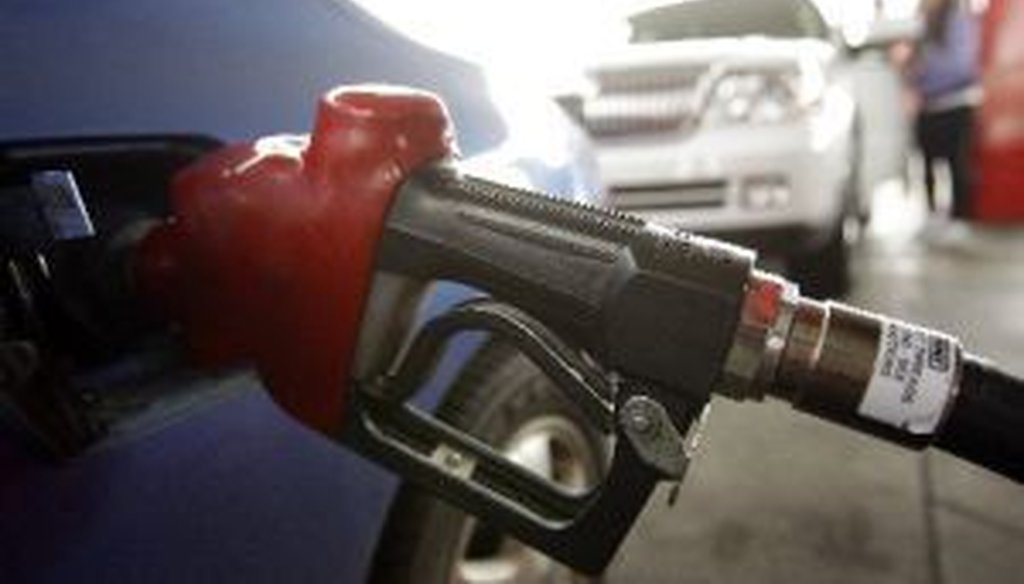Stand up for the facts!
Our only agenda is to publish the truth so you can be an informed participant in democracy.
We need your help.
I would like to contribute

Does pain at the pump originate at the White House?
You’re paying more to fill up your tank, and it’s Barack Obama’s fault.
That’s the refrain echoing across the campaign trail, with Mitt Romney blaming the president for not developing more domestic sources of oil and Rick Santorum saying it’s Obama’s inaction in the Middle East that has led to the price spike. Newt Gingrich just calls Obama "anti-American" and promises cheaper gasoline when he’s in the White House.
Never mind that industry experts say they’re breathing fumes.
"(The president) has very little control over gas prices," Patrick DeHaan, a senior petroleum analyst at gasbuddy.com, a collection of local websites that helps drivers find low prices, told PolitiFact Virginia earlier this year.
It’s simple supply and demand, PolitiFact Georgia wrote in 2011. Geopolitical forces on the other side of the world are a major price driver, as is the state of the global economy. Energy technology plays a role too.
But none of that resonates as well as the political gas price blame game.
The tradition dates back to the 1970s, said John Kingston, global director of news for the energy publication Platts. Until then, oil prices had remained relatively stable.
But in 1973 an Arab oil embargo forced President Richard Nixon to explain why prices shot up all the way to 55 cents a gallon.
Jimmy Carter was the unlucky occupant of the White House during the Iranian revolution in 1979. The fall of the shah led to a drop in oil production in Iran. Inflation was rampant, and it added up to nearly doubled U.S. prices and long lines at gas stations.
Approaching the election in 1980, Carter’s approval rating plummeted to 26 percent. Attacks came from all sides. Sen. Edward Kennedy, who challenged Carter in the Democratic primary, pledged to voters to drive down prices.
"I would use the full power and influence of the White House to get a rollback in some
areas," Kennedy said, estimating he could win a 10 or 11 cent price cut at the pump.
Ronald Reagan, who went on to take the White House, blamed Carter for ignoring America’s own resources.
"For three years and eight months Mr. Carter has led us to believe that there is an acute shortage of energy resources in this country," Reagan said two months before defeating Carter. "The truth is America has an abundance of energy. But the policies of this administration consistently discourage its discovery and production."
Reagan in 1980 sounds a bit like Romney in 2012.
"I can cut through the baloney ... and just tell him, ‘Mr. President, open up drilling in the Gulf, open up drilling in ANWR (the Arctic National Wildlife Refuge). Open up drilling in continental shelf, drill in North Dakota, drill in Oklahoma and Texas,'" Romney said earlier this month.
The more-domestic-drilling line is "a familiar thing for Republicans to throw at Democrats," said Kingston.
What’s the tried and true Democratic attack on Republicans?
"They‘re too close to the oil companies," Kingston said.
Those both sound like pretty good slogans. (Remember "Drill, baby, drill?") Short, simple and oblivious of economic complexity.
"It’s really complex to explain to people how energy markets work. So in campaigns people are always looking for the bumper sticker," said Jay Hakes, former director of the Energy Information Administration under President Bill Clinton and author of the book "A Declaration of Energy Independence."
But easy layups can clank off the rim.
"There’s a risk," Hakes said. "There’s a point at which you could be insulting the intelligence of the voters. I think most voters have some understanding of markets ... and (blaming the president for prices) can sort of give the impression that the candidate doesn’t understand the oil market."
Look at 1999. Early that year, oil prices were at their lowest ever when adjusted for inflation. Gasoline bottomed out at 95 cents a gallon.
But by the fall of 2000, the price had climbed to $1.55. Was it Bill Clinton’s fault? No, Kingston said.
"That really was the first time you were starting to see Chinese demand increase and other third world demand increase," he said. "It was the first time you were starting to see the supply getting squeezed."
Here's what the politicians were saying:
"Thanks to the failed energy policies of the Clinton-Gore administration, gas prices are skyrocketing," said Republican Dick Armey, House majority leader at the time.
George W. Bush took to reading from Al Gore’s book, written eight years earlier.
"He writes in a book that we ought to have higher fuel prices, and now that he's running for president, and there's higher fuel prices, he seems to be changing his tune," Bush said in June 2000.
Al Gore’s campaign spokesman took shots at George W. Bush’s oil industry ties.
"Voters and motorists are probably directing their ire at the people who put the prices on the pumps, and Bush is joined at the hip with the oil industry," Gore spokesman Doug Hattaway said.
Not a word about China.
Now here we are in 2012, with the election eight months away and gallon of regular unleaded setting us back $3.80 a gallon on average.
Obama, with the bullseye on his back, has been steadfastly defending his energy policy, which he describes as "all of the above," and subtly deflecting blame.
"Anybody who says we can get gas down to two bucks a gallon just isn't telling the truth," he said in March in Orlando.
Surely, he recognized that presidents don't control gas prices four years ago too. Right?
"Here in Ohio," Obama said at a campaign stop in 2008, "you’re paying nearly $3.70 a gallon for gas — 2½ times what it cost when President Bush took office."
Our Sources
See PolitiFact items




















































